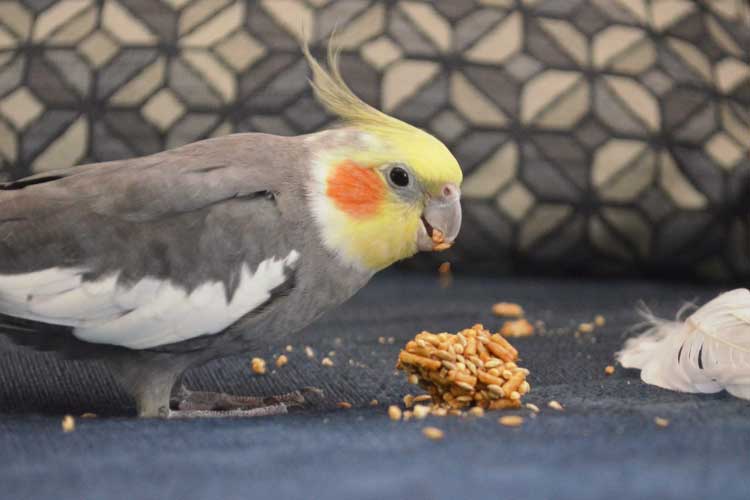It is essential to understand your cockatiel’s nutritional demands and supply them with a diverse and balanced diet to keep them happy and healthy. You must grasp what a pet cockatiel needs to keep fit and healthy.
So, what do cockatiels eat? As omnivorous birds, cockatiels require a diet that includes both plant-based and animal-based foods. In the wild, cockatiels primarily eat seeds, grains, fruit, and vegetables, as well as insects and other small invertebrates for protein.
In captivity, it is important to replicate this varied diet to ensure that your cockatiel is getting all of the nutrients they need. In this article, we will briefly discuss what a cockatiel loves to eat and what not with a brief explanation.
What Do Cockatiels Eat?: Explained the Healthy Food List
We will now quickly jump into a brief discussion illustrating what food should be given to a cockatiel, why it is important as well as what are the benefits of these foods.
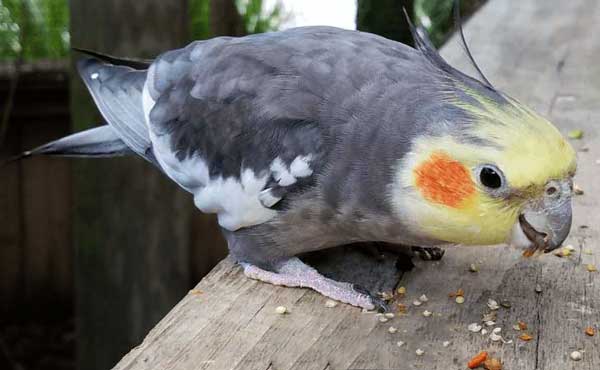
First, a table that includes all the foods that a cockatiel should be given is given below:
| Type of Food | Description |
| Commercial seed mixes | Sunflower seeds, safflower seeds, and millet, along with other grains and legumes |
| Fresh fruits and vegetables | Apples, pears, grapes, lettuce, and spinach |
| Protein sources | Cooked eggs, cooked legumes, and small amounts of cooked, unseasoned meat |
| Treats | Occasional treats, such as millet sprays, small pieces of fruit, or a small amount of cooked, unseasoned meat |
It is indeed important to bear in mind that cockatiels should have a balanced diet that contains a variety of foods rather than depending just on one kind. Besides, it’s necessary to provide your cockatiel with a consistent supply of fresh, clean water in addition to their usual meal.
1. Commercial Seed Mix
A commercial seed mix is the best food for cockatiels. Look for a seed mix that includes a range of seeds, such as sunflower, safflower, and millet. Avoid seed combinations that include predominantly one type of seed, as this might result in nutritional imbalances.
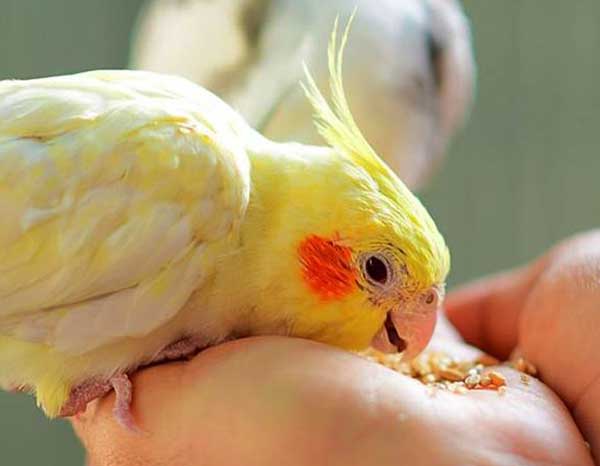
For your cockatiel, especially for an adult cockatiel, it’s crucial to select a high-quality commercial seed mix because some of the less expensive mixes could have more filler seeds. For example, maize and oats, that are not as nutrient-dense as other seeds.
Benefits
Commercial seed mixtures offer an excellent amount of protein, which is important for the development and upkeep of body tissues. This is one of their key advantages. A wide range of vitamins and minerals, including vitamin E, calcium, and phosphorus, are also included in seeds.
These nutrients are crucial for maintaining strong bones, feathers, and skin. Thus, commercial seed mixtures provide cockatiels nutritional advantages as well as mental engagement since they must strive to remove the seeds from the mix.
2. Fresh Fruits and Vegetables
Besides seeds, you should provide your cockatiel with fresh fruits and vegetables, such as wet potatoes, bananas, broccoli, carrots, spinach, and apple pieces.
Protein and fresh water are essential components of a healthy diet for cockatiels. These are especially important for baby cockatiels, who have higher nutritional needs due to their rapid growth and development.
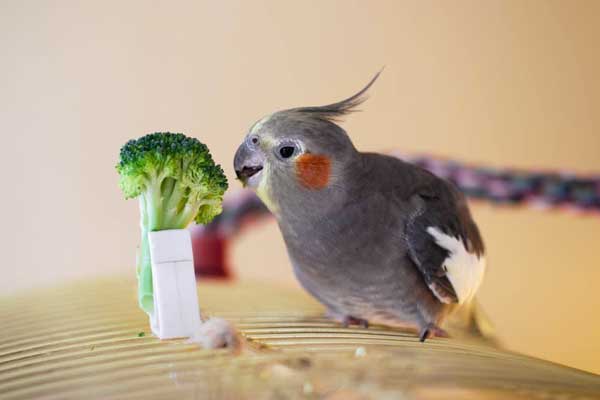
Benefits
Fruits and vegetables are a rich source of vitamins and minerals, such as potassium, vitamin A, vitamin C, and vitamin D, which are essential for good eyesight, immune system function, and muscular performance.
In addition, the majority of fruits and vegetables are low in fat. Thus, these are a great source of fiber which helps to promote healthy digestion and prevent constipation. Also, these are packed with nutrients despite having a low-calorie count.
In terms of cockatiel body language, you may notice that your cockatiel becomes more alert and active when they are offered fresh fruits and vegetables. This can be a sign that they are enjoying the new and interesting flavors and textures of the produce.
Moreover, this can be particularly true of cockatiels that have brightly colored feathers, such as yellow or white cockatiels.
3. Protein and Fresh Water
However, cockatiels need a source of protein in their diet, which may be supplied by including tiny portions of cooked eggs, cooked legumes (such as beans and lentils), and small portions of cooked, plain meat.
These meals should only be offered in cooked form since raw versions may contain dangerous microorganisms. Along with the items mentioned, it’s essential to supply your cockatiel with fresh, clean water consistently. To avoid bacterial growth, be sure to clean and replenish their water dish every day.
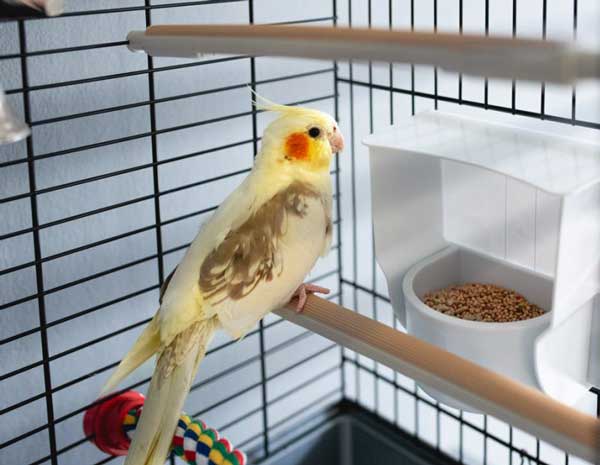
Benefits
Protein is crucial for developing and maintaining bodily tissues, especially for developing chicks and molting birds. It also helps the body’s general functioning and hydration. So, your cockatiel should receive all the nutrition it needs if you want to keep them happy and healthy.
One precaution that needs to be taken while petting a cockatiel is the cockatiel’s color. It is worth noting that white cockatiels may be more prone to developing liver problems if they are not provided with a proper balance diet that includes adequate protein.
This is because white cockatiels have a gene that causes their liver to produce less of a pigment called lipochrome. This helps to protect the liver from damage.
Overall, the key to keeping your cockatiel happy and healthy is to provide them with a variety and well-rounded diet, a clean and safe living space, and lots of attention and engagement.
You can make sure that your cockatiel continues to be a treasured and adored member of your family for years to come by following these rules.
What Does Cockatiel Eat? Explain the List of Food to be Avoided
First, quickly look at the table given below containing the food that should not be given to a cockatiel.
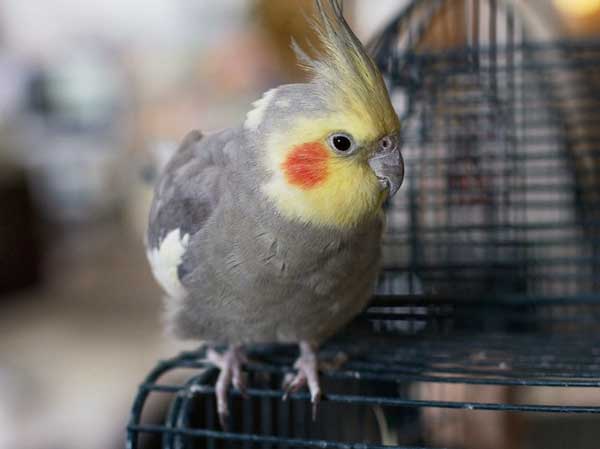
| Food | Reason to Avoid |
| Avocado | contains person, which can be toxic to birds |
| Chocolate | contains theobromine, which can be toxic to birds |
| Alcohol | can cause intoxication and potentially lead to death |
| Caffeine | can cause increased heart rate and potentially lead to death |
| Raw meat, eggs, and beans | can contain bacteria that can cause illness |
| Processed meats | high in salt and preservatives, which can be harmful to birds |
| Onions, garlic, and chives | can damage red blood cells and potentially lead to anemia |
| Apple seeds, cherry pits, and peach pits | contain cyanide, which is toxic |
| Rhubarb leaves | contain oxalic acid, which can be toxic |
| Molds | can produce toxins that can be harmful to birds |
To make sure your cockatiel receives the nutrients they need to keep healthy, serve them a varied and balanced diet. Despite the fact that many meals are both healthy and safe for cockatiels to eat, some items should be avoided.
Don’t Offer Avocado
Avocado is one food that should never be offered to a cockatiel. A fungicidal toxin found in avocados called persin may be poisonous to birds. Breathing problems, fluid buildup in the chest, and digestive problems are signs of persin poisoning in birds.
Avoid Feeding Chocolate
Chocolate seems to be another food to avoid. Theobromine, a substance found in chocolate, can be poisonous to birds. This can accelerate heart rate, produce tremors, and can be fatal.
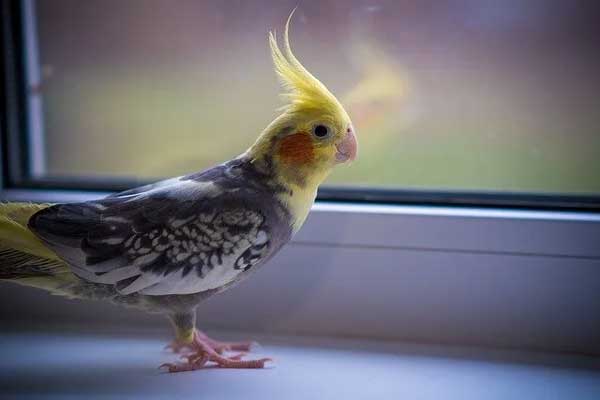
Alcohol and Caffeine are Fatal
Don’t give your cockatiel any alcohol or caffeine, either. Both of these drugs have the ability to kill birds by inducing drunkenness.
Alcohol may be especially harmful to cockatiels since it can lead to a number of major health issues. Alcohol poisoning in birds, which can be fatal, can result from even trace levels of alcohol. Tremors, trouble standing, and respiratory distress are just a few alcohol poisoning symptoms that can affect birds.
Due to its stimulant properties and potential effects on the bird’s nervous system, caffeine can potentially be dangerous for cockatiels. Caffeine in excess can make cockatiels tremble, breathe quickly, and experience heart palpitations.
Additionally, it might disrupt a cockatiel’s sleep cycle and make them irritable or restless.
Raw Meat, Eggs and beans should be Avoided
Since they could contain bacteria that might make birds sick, raw meats, eggs, and beans should also be avoided. Before giving these dishes to your cockatiel, make sure they’ve been cooked properly.
As they are heavy in salt and preservatives that can be hazardous to birds, processed foods like hot dogs and bacon should also be avoided.
Onions and Garlic Harm Blood cells
Also to be avoided are chives, onions, and garlic, which can harm red blood cells and perhaps cause anemia in birds. These two veggies both contain substances that might harm a bird’s red blood cells, causing anemia and other health issues.
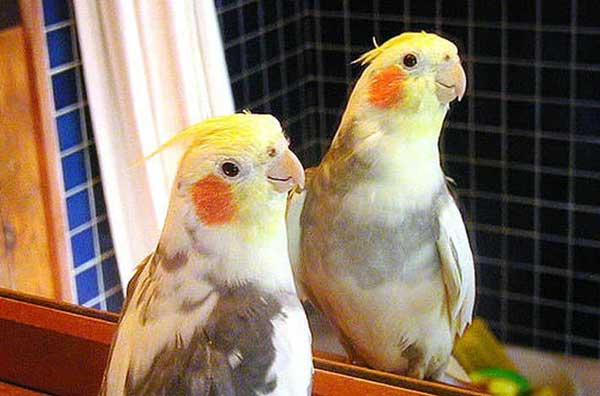
Weakness, lethargy, and respiratory issues are a few signs of onion and garlic poisoning in birds. Hives, or beehives, can contain pesticides and other harmful chemicals that can be toxic to birds. In addition, hives can also pose a choking hazard for small birds like cockatiels due to their size and shape.
Fruit Pits and Sids may have poison
Fruit pits and seeds should also be avoided since they contain cyanide, which is poisonous to birds, including apple seeds, cherry pits, and peach pits. In addition to these items, rhubarb leaves must be avoided since they contain an acid called oxalic acid that can be poisonous to birds.
Overall, it has been shown that the majority of foods that should not be given to cockatiels contain toxic acids or chemicals. You must avoid feeding the mentioned items to your cockatiels.
Feeding a Cockatiel: Two Interesting Facts
Although we have discussed the entire food habits of a cockatiel, including what they should be given and what not, there are some interesting facts too. Let’s explore two interesting things about feeding a cockatiel.
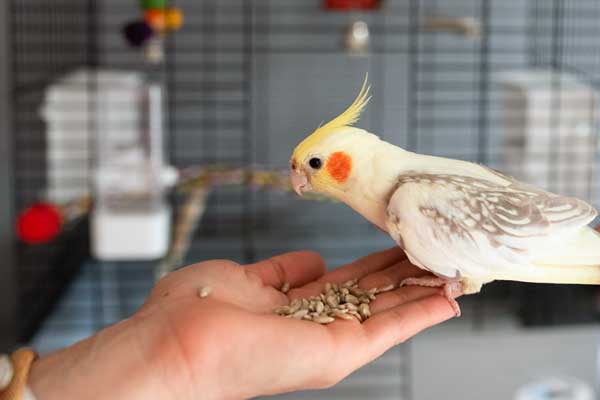
1. Cockatiels are Omnivorous
Cockatiels are omnivores, which means they eat both plant- and animal-based meals, contrary to popular belief that they only ingest seeds. Thus, cockatiels often consume seeds, grains, fruit, and vegetables in the wild, along with insects and other tiny invertebrates that provide protein.
2. Cockatiels Benefit from occasional treats
Even though it’s imperative to provide your cockatiel with a varied diet, you can also occasionally give them treats. Try millet sprays, tiny bits of fruit, or a little portion of cooked, unseasoned chicken as some worthwhile alternatives.
FAQs
Do you have some questions regarding what a cockatiel eats and what doesn’t? Keep your eyes on this section, your questions might be answered here.
Not in general. Cockatiels can eat raw vegetables, but it is important to wash them thoroughly to remove any dirt or pesticides.
While some birds can tolerate small amounts of dairy products, it is generally not recommended to offer them to cockatiels.
Yes, cockatiels need calcium. It is necessary for the development and maintenance of healthy bones and feathers.
Conclusion
So, what cockatiels eat and what don’t, is a matter of knowing. Because there are many shoulds and shouldn’t to keep in mind, especially when it comes to feeding if you want to touch a cockatiel. If you don’t be diligent and start taking safeguards, it might cost your feathery buddy money.
In conclusion, stay away from feeding them poisonous or acidic foods. They might get sick or it can even be deadly. Moreover, excessive feeding should be avoided to keep them secure. Besides, give them fresh fruit and vegetables, adequate protein, and clean water in place of all this avoided junk.
